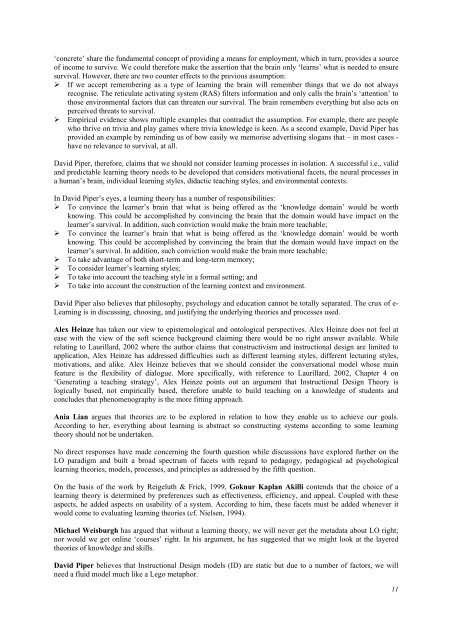Ontologies and the Semantic Web for E-learning - Educational ...
Ontologies and the Semantic Web for E-learning - Educational ...
Ontologies and the Semantic Web for E-learning - Educational ...
Create successful ePaper yourself
Turn your PDF publications into a flip-book with our unique Google optimized e-Paper software.
‘concrete’ share <strong>the</strong> fundamental concept of providing a means <strong>for</strong> employment, which in turn, provides a source<br />
of income to survive. We could <strong>the</strong>re<strong>for</strong>e make <strong>the</strong> assertion that <strong>the</strong> brain only ‘learns’ what is needed to ensure<br />
survival. However, <strong>the</strong>re are two counter effects to <strong>the</strong> previous assumption:<br />
If we accept remembering as a type of <strong>learning</strong> <strong>the</strong> brain will remember things that we do not always<br />
recognise. The reticulate activating system (RAS) filters in<strong>for</strong>mation <strong>and</strong> only calls <strong>the</strong> brain’s ‘attention’ to<br />
those environmental factors that can threaten our survival. The brain remembers everything but also acts on<br />
perceived threats to survival.<br />
Empirical evidence shows multiple examples that contradict <strong>the</strong> assumption. For example, <strong>the</strong>re are people<br />
who thrive on trivia <strong>and</strong> play games where trivia knowledge is keen. As a second example, David Piper has<br />
provided an example by reminding us of how easily we memorise advertising slogans that – in most cases -<br />
have no relevance to survival, at all.<br />
David Piper, <strong>the</strong>re<strong>for</strong>e, claims that we should not consider <strong>learning</strong> processes in isolation. A successful i.e., valid<br />
<strong>and</strong> predictable <strong>learning</strong> <strong>the</strong>ory needs to be developed that considers motivational facets, <strong>the</strong> neural processes in<br />
a human’s brain, individual <strong>learning</strong> styles, didactic teaching styles, <strong>and</strong> environmental contexts.<br />
In David Piper’s eyes, a <strong>learning</strong> <strong>the</strong>ory has a number of responsibilities:<br />
To convince <strong>the</strong> learner’s brain that what is being offered as <strong>the</strong> ‘knowledge domain’ would be worth<br />
knowing. This could be accomplished by convincing <strong>the</strong> brain that <strong>the</strong> domain would have impact on <strong>the</strong><br />
learner’s survival. In addition, such conviction would make <strong>the</strong> brain more teachable;<br />
To convince <strong>the</strong> learner’s brain that what is being offered as <strong>the</strong> ‘knowledge domain’ would be worth<br />
knowing. This could be accomplished by convincing <strong>the</strong> brain that <strong>the</strong> domain would have impact on <strong>the</strong><br />
learner’s survival. In addition, such conviction would make <strong>the</strong> brain more teachable;<br />
To take advantage of both short-term <strong>and</strong> long-term memory;<br />
To consider learner’s <strong>learning</strong> styles;<br />
To take into account <strong>the</strong> teaching style in a <strong>for</strong>mal setting; <strong>and</strong><br />
To take into account <strong>the</strong> construction of <strong>the</strong> <strong>learning</strong> context <strong>and</strong> environment.<br />
David Piper also believes that philosophy, psychology <strong>and</strong> education cannot be totally separated. The crux of e-<br />
Learning is in discussing, choosing, <strong>and</strong> justifying <strong>the</strong> underlying <strong>the</strong>ories <strong>and</strong> processes used.<br />
Alex Heinze has taken our view to epistemological <strong>and</strong> ontological perspectives. Alex Heinze does not feel at<br />
ease with <strong>the</strong> view of <strong>the</strong> soft science background claiming <strong>the</strong>re would be no right answer available. While<br />
relating to Laurillard, 2002 where <strong>the</strong> author claims that constructivism <strong>and</strong> instructional design are limited to<br />
application, Alex Heinze has addressed difficulties such as different <strong>learning</strong> styles, different lecturing styles,<br />
motivations, <strong>and</strong> alike. Alex Heinze believes that we should consider <strong>the</strong> conversational model whose main<br />
feature is <strong>the</strong> flexibility of dialogue. More specifically, with reference to Laurillard, 2002, Chapter 4 on<br />
‘Generating a teaching strategy’, Alex Heinze points out an argument that Instructional Design Theory is<br />
logically based, not empirically based, <strong>the</strong>re<strong>for</strong>e unable to build teaching on a knowledge of students <strong>and</strong><br />
concludes that phenomenography is <strong>the</strong> more fitting approach.<br />
Ania Lian argues that <strong>the</strong>ories are to be explored in relation to how <strong>the</strong>y enable us to achieve our goals.<br />
According to her, everything about <strong>learning</strong> is abstract so constructing systems according to some <strong>learning</strong><br />
<strong>the</strong>ory should not be undertaken.<br />
No direct responses have made concerning <strong>the</strong> fourth question while discussions have explored fur<strong>the</strong>r on <strong>the</strong><br />
LO paradigm <strong>and</strong> built a broad spectrum of facets with regard to pedagogy, pedagogical ad psychological<br />
<strong>learning</strong> <strong>the</strong>ories, models, processes, <strong>and</strong> principles as addressed by <strong>the</strong> fifth question.<br />
On <strong>the</strong> basis of <strong>the</strong> work by Reigeluth & Frick, 1999, Goknur Kaplan Akilli contends that <strong>the</strong> choice of a<br />
<strong>learning</strong> <strong>the</strong>ory is determined by preferences such as effectiveness, efficiency, <strong>and</strong> appeal. Coupled with <strong>the</strong>se<br />
aspects, he added aspects on usability of a system. According to him, <strong>the</strong>se facets must be added whenever it<br />
would come to evaluating <strong>learning</strong> <strong>the</strong>ories (cf. Nielsen, 1994).<br />
Michael Weisburgh has argued that without a <strong>learning</strong> <strong>the</strong>ory, we will never get <strong>the</strong> metadata about LO right;<br />
nor would we get online ‘courses’ right. In his argument, he has suggested that we might look at <strong>the</strong> layered<br />
<strong>the</strong>ories of knowledge <strong>and</strong> skills.<br />
David Piper believes that Instructional Design models (ID) are static but due to a number of factors, we will<br />
need a fluid model much like a Lego metaphor.<br />
11
















